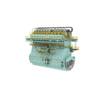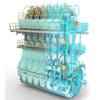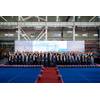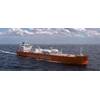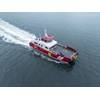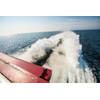California Ferry Operator AITF Moves to Electrify Its Fleet in CARB-backed Project
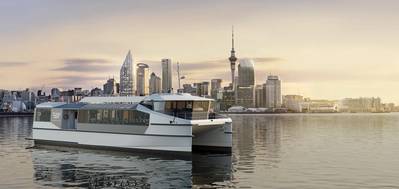
EV Maritime’s EVM200 battery electric commuter fast ferry, of which the first two are nearing completion in New Zealand for public transportation authority Auckland Transport. (Image: EV Maritime)
Angel Island Tiburon Ferry (AITF), in California, has tapped New-Zealand-based EV Maritime to design a plug-in hybrid electric vessel for its fleet in the San Francisco Bay Area. The project, which will also see the electrification of two existing AITF vessels, has been funded by the California Air Resources Board (CARB). The hybrid ferry will be designed and engineered by EV Maritime with electrical integration provided by ZeroMar, a local company in the Bay Area.
“This new vessel will be plug-in hybrid, able to operate fully electric on shorter routes but with hybrid capability for longer range service. By using EV Maritime’s efficiency-optimized hull form and carbon fiber composite construction, this plug-in hybrid vessel will dramatically reduce fuel consumption and exhaust emissions,” said Michael Eaglen, CEO of EV Maritime.
“As a provider of transportation to a State Park, and a host to numerous visitors to the Bay, Angel Island Tiburon Ferry is already conscious of their leadership role. This project will be a powerful example for others to follow.”
AITF currently operates three vessels that provide ferry service between Tiburon and Angel Island, as well as private charters, whale watching and sunset cruises.
“As a fourth-generation captain, and as a woman-owned micro business in a small town, we are so fortunate to have this opportunity,” said Maggie McDonogh, a fourth-generation charter captain as well as the owner and operator of AITF, a company founded by her father Milton in 1959.
“We are located on the coast, and strongly believe that what we do here affects everything inland,” McDonogh said. “Not only is going electric the right thing to do, I see it as our moral obligation to preserve the environment for future generations. Converting our existing boats, which are still fully serviceable, is a no-brainer effort with a low carbon footprint. As for the boat we are building, I am confident that this new vessel packed with cutting-edge electric technology will stand as a shining example of what is possible.”
Increasingly, commercial vessel owners are exploring electrification as a means to reduce emissions from their operations—especially in the passenger ferry sector where short, repeated routes can be served by today's available technology.
For EV Maritime, the contract signed with AITF on July 12 is its first in the United States. In New Zealand, the company is currently working to introduce electric fast ferries to the commuter ferry fleet in Auckland—a project directly supported by the central government there.


